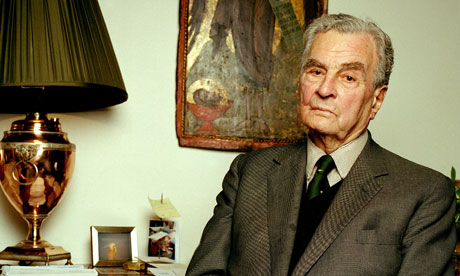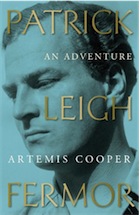Life was one great adventure for Patrick Leigh Fermor. The hard part now is to separate the fact from the fiction

‘A dangerous mixture of sophistication and recklessness’: Patrick Leigh Fermor in 2008.
Photograph: Eamonn Mccabe for the Guardian
Traveller and writer Paddy Leigh Fermor is best known for two events. In 1933, at the age of 18, he set off with a little money and a lot of nerve to walk from the Hook of Holland to Constantinople. Eleven years later, with an equal amount of nerve, he led a commando group to occupied Crete to kidnap General Kreipe, the local Nazi commander. From these two events sprang the subjects and passions for his work and his life, the subject of Artemis Cooper's new biography
 Fermor is a seriously challenging subject for any biographer, perhaps more so for Cooper, who knew him from a very early age. She was contracted to write the book in the 1990s but on the condition it did not appear before his death, perhaps wanting to spare his wife, friends and self the stories of his sexual adventures. Given his wine and cigarette intake, Cooper would have been forgiven for thinking he wouldn't last as long as he did: he died last year at the age of 96. But not even close acquaintance with her subject and unrestricted access to his archive and friends will have made it any easier to get around the main obstacle: the man himself.
Fermor is a seriously challenging subject for any biographer, perhaps more so for Cooper, who knew him from a very early age. She was contracted to write the book in the 1990s but on the condition it did not appear before his death, perhaps wanting to spare his wife, friends and self the stories of his sexual adventures. Given his wine and cigarette intake, Cooper would have been forgiven for thinking he wouldn't last as long as he did: he died last year at the age of 96. But not even close acquaintance with her subject and unrestricted access to his archive and friends will have made it any easier to get around the main obstacle: the man himself.
A school and army reject, Fermor was a self-made man in the most literal sense. He started, in the words of his headmaster, as "a dangerous mixture of sophistication and recklessness". With those and other qualities, he honed his character with the company of extraordinary people and the words of great writers – he had a prodigious memory for prose as well as poetry. However complex his character, it was made more so, from a biographer's point of view, by the fact that he had already written his own version of some of his life. His books contain some of the finest prose writing of the past century and disprove Wilde's maxim that "it is better to have a permanent income than to be fascinating".
Charm, self-taught knowledge and enthusiasm made up for the lack of a university degree or a private income. His teenage walk across Europe and subsequent romantic sojourn in Baleni, Romania, with Princess Balasha Cantacuzene are proof enough of that. But the difficulty of capturing such an unconventional and glamorous life is made harder by the certainty that Fermor was an unreliable narrator.
He was also an infuriatingly slow writer. Driven by a life-long passion for words yet hampered by anxiety about his abilities, Fermor published eight books over 41 years. The Traveller's Tree describes his postwar journey through the Caribbean; Mani and Roumeli (1958 and 1966) draw on his experiences in Greece, where he would live for much of the latter part of his life. But it is the books that came out of his trans-Europe walk that reveal both the brilliance and the flaws. A Time of Gifts was published in 1977, 44 years after he set out on the journey. Between the Woods and the Water appeared nine years later. Both describe a world of privilege and poverty, communism and the rising tide of Nazism, and end with the unequivocal words, "To be continued". Yet the third volume hung like an albatross around the author's neck. As the years passed, Fermor found it impossible to shape the last part of his story in the way he wanted. Yet Cooper refers to one manuscript written in the 1960s, and a diary, and from these the final volume will be fashioned and published next year.
Full review in The Observer
 Fermor is a seriously challenging subject for any biographer, perhaps more so for Cooper, who knew him from a very early age. She was contracted to write the book in the 1990s but on the condition it did not appear before his death, perhaps wanting to spare his wife, friends and self the stories of his sexual adventures. Given his wine and cigarette intake, Cooper would have been forgiven for thinking he wouldn't last as long as he did: he died last year at the age of 96. But not even close acquaintance with her subject and unrestricted access to his archive and friends will have made it any easier to get around the main obstacle: the man himself.
Fermor is a seriously challenging subject for any biographer, perhaps more so for Cooper, who knew him from a very early age. She was contracted to write the book in the 1990s but on the condition it did not appear before his death, perhaps wanting to spare his wife, friends and self the stories of his sexual adventures. Given his wine and cigarette intake, Cooper would have been forgiven for thinking he wouldn't last as long as he did: he died last year at the age of 96. But not even close acquaintance with her subject and unrestricted access to his archive and friends will have made it any easier to get around the main obstacle: the man himself.A school and army reject, Fermor was a self-made man in the most literal sense. He started, in the words of his headmaster, as "a dangerous mixture of sophistication and recklessness". With those and other qualities, he honed his character with the company of extraordinary people and the words of great writers – he had a prodigious memory for prose as well as poetry. However complex his character, it was made more so, from a biographer's point of view, by the fact that he had already written his own version of some of his life. His books contain some of the finest prose writing of the past century and disprove Wilde's maxim that "it is better to have a permanent income than to be fascinating".
Charm, self-taught knowledge and enthusiasm made up for the lack of a university degree or a private income. His teenage walk across Europe and subsequent romantic sojourn in Baleni, Romania, with Princess Balasha Cantacuzene are proof enough of that. But the difficulty of capturing such an unconventional and glamorous life is made harder by the certainty that Fermor was an unreliable narrator.
He was also an infuriatingly slow writer. Driven by a life-long passion for words yet hampered by anxiety about his abilities, Fermor published eight books over 41 years. The Traveller's Tree describes his postwar journey through the Caribbean; Mani and Roumeli (1958 and 1966) draw on his experiences in Greece, where he would live for much of the latter part of his life. But it is the books that came out of his trans-Europe walk that reveal both the brilliance and the flaws. A Time of Gifts was published in 1977, 44 years after he set out on the journey. Between the Woods and the Water appeared nine years later. Both describe a world of privilege and poverty, communism and the rising tide of Nazism, and end with the unequivocal words, "To be continued". Yet the third volume hung like an albatross around the author's neck. As the years passed, Fermor found it impossible to shape the last part of his story in the way he wanted. Yet Cooper refers to one manuscript written in the 1960s, and a diary, and from these the final volume will be fashioned and published next year.
Full review in The Observer
No comments:
Post a Comment